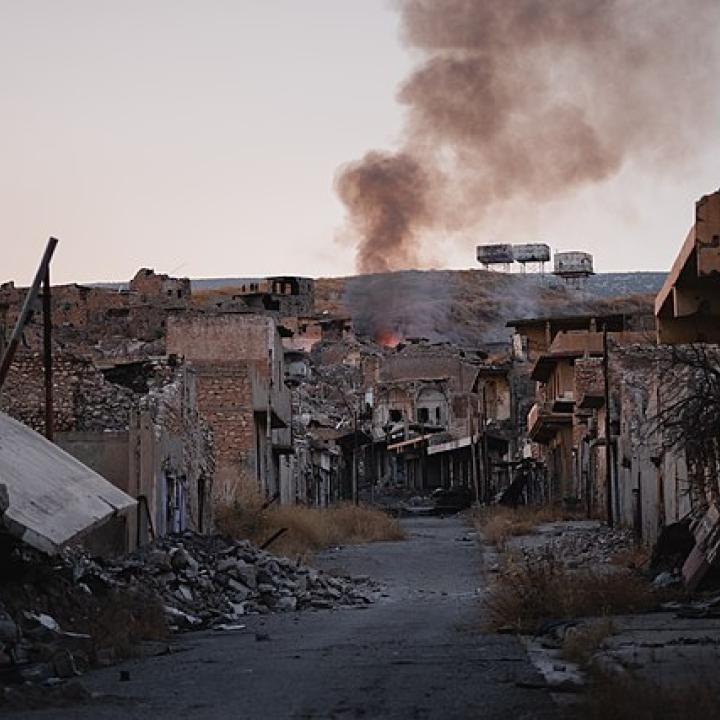
- Policy Analysis
- Fikra Forum
Sinjar: Challenges and Resilience Nine Years after Genocide

The ninth anniversary of the Yazidi Genocide in Sinjar, Iraq is drawing near, a tragedy in which thousands of Yazidis were murdered, Yazidi women and children were enslaved, and Yazidi villages and compounds were destroyed by ISIS in August 2014.
Nearly a decade later, many victims are still missing, and thousands now live in displacement camps in unstable, unsanitary conditions.
This anniversary is an opportunity to reflect on the ongoing armed conflict in the Sinjar region and the profound influence on its inhabitants. It also serves as an opportunity to appreciate the resilience of the Yazidis, looking toward a future with new hope and new aspirations—a future where Yazidis can experience peace, stability, justice, and equitable opportunities to reconstruct their lives and their communities.
Yazidi resilience is clearly evident in how they bore the burden of this genocide, how they have persevered in the face of ongoing persecution and genocide for centuries, and how they have been steadfast in maintaining their identity and heritage despite these adversities and the repeated campaigns to tarnish their image.
Yet Yazidis still face significant challenges in Iraq today. Despite relative stability in the Sinjar region, there are concerns among the Yazidi population about the return of armed conflict between groups vying for influence. Even more troubling, the issue of expulsion and displacement remains unresolved despite the liberation of Sinjar from ISIS in 2015. Many Yazidis still live in displacement camps, where they are without their homes, their land, or their basic rights. These refugees have yet to be materially compensated for their losses.
Moreover, many Yazidis still face the difficult road of post-traumatic psychological recovery in the aftermath of the genocide, especially the Yazidi women and children abducted by ISIS. These victims desperately need psychological, medical, economic, and moral support to alleviate their suffering and return them to normal life. To make matters worse, anti-Yazidi rhetoric has become even more widespread due to the accessibility of social media, and there are few legal deterrents to limit these campaigns and protect Yazidis.
When it comes to preventing the recurrence of genocide, Yazidis still have a long way to go to achieve even transitional justice. First and foremost, trust and confidence must be rebuilt on the local level—between members of the Yazidi community and regional inhabitants and official institutions. On a broader level, Yazidis and their international friends have been working to establish a special international tribunal to prosecute the terrorists involved in the Sinjar genocide—a crucial step in ensuring justice. These tribunals take a similar approach to that of the German courts, which carried out judicial rulings against terrorists and perpetrators of war crimes using evidence documented by human rights organizations and the United Nations.
As for reconstruction efforts, there is again a long road ahead. From the inception of the Iraqi State until 2014, Sinjar has suffered from deliberate negligence and marginalization at the hands of the ruling regimes. Despite the massive sums earmarked for the region by successive governments after 2003, the area has not seen any effective reconstruction efforts. Even after the liberation of Sinjar and the fall of ISIS, there has been no real interest in rebuilding because of the ongoing political conflicts in the region. In fact, the Iraqi government has allocated little money from the national treasury to reconstruction of the affected areas, despite the funds established to do so in 2015 under Article 28 of the federal budget law.
On this ninth anniversary, Yazidis demand a fair distribution of this money, commensurate to their population size and to the damage they have suffered. Yazidis also demand legal, social, and psychological support in the aftermath of the genocide, so that they may pursue justice and a dignified life. Yazidis in Sinjar hope for a return to stability in the region, a reconstruction of the infrastructure lost, and a boost in economic development to provide the conditions appropriate for the return of displaced persons. They hope for a return to normal life.
However, these hopes remain suspended and unfulfilled because of political disagreements between local and regional actors that stand in the way of psychological and physical reconstruction efforts. Therefore, it is up to the Iraqi government to seriously deal with the crisis of resettling displaced persons in their rightful areas and providing all Yazidis with the basic support and services they deserve after they were subjected to such brutal crimes. The government must also work to achieve overall security and stability for the city of Sinjar by combating the phenomenon of terrorism aimed at religious minorities in general, and at Yazidis in particular.
Considering the repercussions of the Yazidi genocide and its devastating impact on the population, the question remains: is it possible for these people to end their story of tragedy, recover their identity, and live a safe, secure life into tomorrow? With the commitment of the international community, local and national government, and the continuing efforts of the Yazidis, these aspirations can be realized, and the challenges impeding Sinjar’s return to stability and safety can be overcome.


